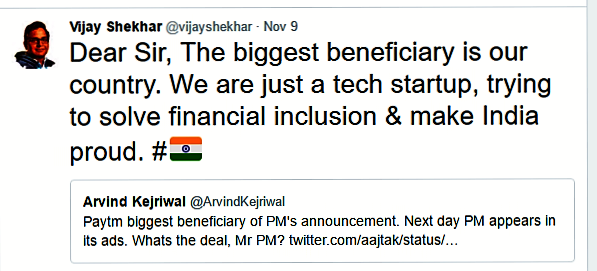The US election result has shocked everyone (at least most of the people) across the world. While many countries were (are) discussing Donald Trump’s surprise victory in the American presidential race, another major development kept most of the Indians occupied. Yes, we are talking about the Indian government’s bold decision to ban Rs. 500 and Rs. 1000 notes to fight corruption, black money and fake notes.
Most of the ecommerce companies, digital start-ups and citizens of the country are happy about this move taken by the government to combat black money. Celebrities and founders of digital companies took to social media to express their support.
Flipkart spokesperson shares with Indian Online Seller (IOS), “We welcome this bold and historic initiative by the Government of India. This will enable India to move faster towards digital payments and will be a game changer for Flipkart and for the ecommerce industry.”
“We welcome Prime Minister Narendra Modi’s decision to phase out the circulation of Rs 500 and Rs 1000 bank notes as this will bring transparency and stronger accountability. This will definitely give a boost to digital payments and will encourage people to shop more online. From the retailer’s point, cash on delivery (CoD) options will see a fall which in turn will lead customers to place more orders through cards and net-banking. Wallets like Paytm, Jio Money will see an increase of usability. CashKaro has always believed in transparency and our cashback is transferred to user’s Bank Account or can be redeemed as Gift Vouchers,” asserts Rohan Bhargava, Co-Founder, CashKaro.com.
One of the immediate effects of this decision was suspension of cash-on-delivery service. Online marketplaces Amazon, Flipkart, Shopclues, food delivery service Zomato, e-grocery firm BigBasket and many other ecommerce sites promptly messaged their subscribers and put a banner on their platforms about unavailability of COD payment method.
On Flipkart, COD is currently not available for orders greater than Rs. 1000. Flipkart spokesperson informs IOS,
“We are no longer accepting Cash-on-Delivery (CoD) payments in ₹500 and ₹1000 currency notes. In order to enable customers to conserve smaller denomination notes for daily essential use, we are restricting CoD on orders below Rs. 1000.”
When asked about the fate of previously placed COD orders, Flipkart’s spokesperson says,
“We urge our customers to opt for alternative payment modes such as card on delivery, internet banking, credit and debit cards, gift cards, and our easy and convenient PhonePe wallet. We are also working on a slew of measures to help customers easily transition from cash to digital payments.”
While speaking to IOS, Amazon India’s spokesperson states,
“We understand that there will be a temporary impact on customers’ day to day payment transactions. Currently, we have temporarily stopped cash as a payment option for new orders.”
The American etailer’s spokesperson adds,
“Customers that had already placed COD orders before midnight 8/11 can pay for their orders using debit or credit cards or currency of valid denominations. For future orders, we are working on alternatives to make doorstep payments easier for customers by introducing a variety of electronic payment options.”
As we know, cash-on-delivery is the necessary evil as nearly 60-70% buyers prefer to pay through COD mode instead of digital payments. So a drop in sales and issues in order fulfilment was an expected outcome of etailers’ decision to suspend COD service.
“Prepaid (or card transactions) is better unit economics, but since we have a higher (share of) CoD, this will have an impact in the short term,” said Voonik founder Sujayath Ali.
According to reports, nearly 1.6-2 million COD shipments are trapped, since etailers are no longer accepting Rs. 500 and Rs. 1000 notes. But ecommerce companies believe that this temporary inconvenience will give way for better times ahead. Many hope that this will push buyers to finally embrace digital payments as opposed to heavy reliance on COD payments.
Amazon India spokesperson reveals to IOS,
“In the last two days, electronic payments at doorstep have gone up by a factor of 10X. This clearly indicates that customers are able to adapt to electronic payment methods when cash is constrained. We continue to focus on incentivizing and helping people shift to making payments electronically online, aligned with the government’s focus. Today, we have launched an offer for customers to go cashless – customer can load their Amazon gift card balance and get an instant incentive of 15% / max. Rupees 300. discount at checkout. We will continue to improve serving our customers on electronic payment methods both at the time of order and at the doorstep.”
Myntra’s CEO Ananth Narayanan said,
“There might be a short term impact on e-commerce transactions given the dependence on cash on delivery as a preferred mode of payment, but in the longer term we don’t foresee any material change in consumer spending.”
In this entire situation, it appears that the biggest benefiters are e-wallet companies like Paytm. People short of cash, right from newlyweds to taxi drivers, from chaiwala to restaurants, readily started accepting money via Paytm.
So much so, that even Delhi Chief Minister Arvind Kejriwal tweeted about it and Paytm’s founder Vijay Shekhar Sharma promptly replied too.

Demonetisation is a very progressive step as it will bring transparency and accountability. Is this the beginning of cash-free ‘Digital India’? Sellers, what do you think? Let us know through your comments

Leave a Comment